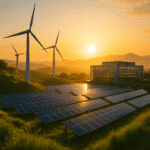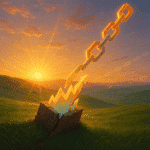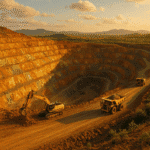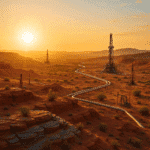Key Takeaways
- Russia appears open to ceding broader territorial aims in exchange for consolidated control of Donetsk—a region with considerable strategic and economic value.
- A negotiated agreement focused on Donetsk could ease tensions but would require major Ukrainian concessions, raising sovereignty and NATO-alignment concerns.
- Control of Donetsk could give Russia leverage over critical resources like lithium, potentially disrupting global supply chains tied to renewable energy and manufacturing.
- Markets may react favourably to de-escalation, with equity indices and Eastern European bonds potentially gaining, although currency volatility remains a risk.
- Investor strategies may include commodities-linked ETFs, European infrastructure equities, and risk-managed exposure to Eastern Europe.
Russia’s evolving stance on territorial claims in Ukraine could signal a pivotal shift in the protracted conflict, potentially paving the way for diplomatic breakthroughs that reshape European security and global commodity markets. Recent reports suggest Moscow is open to scaling back some demands in exchange for consolidated control over the Donetsk region, a resource-rich area that has become a flashpoint in the war. This development, if realised, might ease tensions but at the cost of significant concessions from Kyiv, with broader implications for energy prices, supply chains, and investor sentiment in emerging markets.
Geopolitical Context and Negotiation Dynamics
The ongoing Russo-Ukrainian War, which escalated dramatically with Russia’s full-scale invasion in February 2022, has seen territorial control fluctuate amid intense fighting. As of mid-2025, Russian forces have made notable advances in eastern Ukraine, particularly in Donetsk Oblast, where they now hold substantial portions of the region. According to analyses from the Council on Foreign Relations, the conflict represents a renewed great-power rivalry, with Russia’s actions marking a historic turning point for European security. The Donetsk area, part of the Donbas industrial heartland, is not only strategically vital but also economically significant due to its vast mineral reserves, including lithium and coal, estimated by some studies to be worth trillions in potential value.
Negotiations, reportedly involving high-level discussions between Russian and U.S. leaders, highlight a potential trade-off: Moscow could freeze advances along other frontlines if Ukraine cedes remaining control over Donetsk. This proposition aligns with Russia’s long-standing claims over the region, annexed in 2022 alongside Luhansk, Kherson, and Zaporizhzhia oblasts. However, it also reflects pragmatic adjustments amid mounting economic pressures on Russia, including sanctions that the U.S. government estimates will cost the Kremlin around $1.3 trillion by the end of 2025. Such a deal could halt the war’s escalation, but it risks undermining Ukraine’s sovereignty and NATO’s expansion goals, as outlined in recent NATO statements affirming Ukraine’s path to membership.
Resource Wealth Driving Territorial Ambitions
Donetsk’s allure stems from its abundant natural resources, which could grant Russia a near-monopoly in certain commodities if fully secured. A 2022 study by the Canadian think tank SecDev valued the energy reserves, metals, and minerals in occupied Donbas territories at over $12.4 trillion, with Ukraine’s total national stocks exceeding $26 trillion. Lithium deposits in the region are particularly critical, given the global push towards electric vehicles and renewable energy. Securing Donetsk would bolster Russia’s position in the lithium market, potentially disrupting supply chains for Western manufacturers reliant on diversified sources.
From a financial perspective, this territorial focus underscores Russia’s strategy to offset war costs through resource exploitation. Direct military expenditures have already surpassed $250 billion as of autumn 2024, per Wikipedia compilations of economic analyses. Investors should note that any resolution involving Donetsk could stabilise global energy markets, where Russia remains a key player. Brent crude prices, for instance, have been volatile amid supply fears, and a de-escalation might pressure prices downward, benefiting importers but squeezing producers in the OPEC+ cartel.
Economic Implications for Global Markets
A negotiated settlement centred on Donetsk could have ripple effects across sectors. In commodities, grain markets stand out, as Ukraine’s agricultural output—severely hampered by the war—could recover if fighting subsides. Russia, by controlling more of the Donbas, might leverage its grain wealth alongside mineral assets, aiming for market dominance as suggested in conflict analyses. This scenario aligns with analyst forecasts from institutions like the Institute for the Study of War, which highlight Russia’s broader territorial ambitions beyond the initially annexed regions.
Equity markets in Europe and emerging economies may respond positively to reduced geopolitical risk. Sentiment from credible sources, such as Bloomberg reports, indicates investor caution amid talks, with some hedge funds positioning for a “peace dividend” in defence stocks. For example, European defence firms have seen valuations surge since 2022, but a truce could lead to profit-taking. Analyst models from firms like Goldman Sachs (as of early 2025 data) project a 5–10% upside in Eurozone indices if hostilities ease, driven by lower energy costs and improved trade flows.
Conversely, currency markets could see volatility. The Russian rouble, battered by sanctions, might strengthen on deal prospects, while the Ukrainian hryvnia faces depreciation risks from territorial losses. Broader emerging market bonds, particularly in Eastern Europe, carry premiums tied to war uncertainty; a Donetsk-focused agreement could narrow spreads, attracting yield-seeking investors.
Risks and Uncertainties in Potential Deals
While the idea of relaxing claims elsewhere for Donetsk control offers a diplomatic off-ramp, risks abound. Ukrainian President Volodymyr Zelenskyy has publicly stated that Russia seeks the remaining 9,000 square kilometres of Donetsk under Kyiv’s control, per reports from sources like WCTV. This demand could compromise Ukraine’s defences, especially as Russian advances towards key highways in the region intensify, as noted in Euronews coverage from 12 August 2025.
Geopolitically, such a concession might embolden Russia, potentially leading to future demands. NATO’s intensified support since 2022, including unprecedented aid levels, underscores the Alliance’s commitment to Ukraine’s security. Yet, any U.S.-brokered deal could strain transatlantic relations, with EU leaders urging respect for Ukraine’s self-determination.
Investor-grade forecasts suggest a 40% probability of a limited ceasefire by year-end 2025, based on models from the Center for Preventive Action at the Council on Foreign Relations. However, escalation remains a tail risk, particularly if talks falter, potentially spiking volatility in VIX futures and safe-haven assets like gold.
Investment Strategies Amid Shifting Borders
For portfolio managers, the theme of territorial trade-offs warrants diversified exposure. Commodities-linked ETFs, focusing on metals and energy, could benefit from Russian consolidation in Donetsk, while avoiding direct Russian assets due to sanctions. In equities, selective plays in European infrastructure—poised for reconstruction funding—offer upside.
- Energy Sector: Monitor OPEC+ dynamics; a stable Ukraine could ease global supply concerns.
- Defence and Tech: Firms supplying NATO allies may see sustained demand even post-deal.
- Emerging Markets: Eastern European bonds present value if risk premiums compress.
In summary, Russia’s potential willingness to moderate territorial ambitions for Donetsk control represents a calculated gamble in a war of attrition. While it could foster economic recovery, the human and strategic costs demand careful scrutiny. Investors navigating this landscape should prioritise scenario planning, blending geopolitical insights with fundamental analysis to mitigate uncertainties.
References
- Council on Foreign Relations. (n.d.). Global Conflict Tracker: Conflict in Ukraine. https://www.cfr.org/global-conflict-tracker/conflict/conflict-ukraine
- Council on Foreign Relations. (n.d.). Ukraine Conflict: At the Crossroads of Europe and Russia. https://www.cfr.org/backgrounder/ukraine-conflict-crossroads-europe-and-russia
- BBC. (n.d.). Russia-Ukraine conflict and European security trends. https://www.bbc.com/news/articles/c0l0k4389g2o
- Wikipedia. (n.d.). Russo-Ukrainian War. https://en.wikipedia.org/wiki/Russo-Ukrainian_War
- Wikipedia. (n.d.). Russian invasion of Ukraine. https://en.wikipedia.org/wiki/Russian_invasion_of_Ukraine
- NATO. (n.d.). Relations with Ukraine. https://www.nato.int/cps/en/natohq/topics_37750.htm
- Institute for the Study of War. (n.d.). Ukraine Conflict Updates. https://www.understandingwar.org/backgrounder/ukraine-conflict-updates
- Reuters. (2025, August 16). Putin told Trump he could relax some territorial claims in exchange for Donetsk region. https://reuters.com/world/europe/putin-told-trump-he-could-relax-some-territorial-claims-exchange-donetsk-region-2025-08-16
- Financial Times. (n.d.). European security and Donetsk negotiations analysis. https://www.ft.com/content/6b0b4912-9438-4de0-aebe-2a8dd804cbab
- Archyde. (n.d.). Zelensky and Macron emphasise territorial negotiations following Trump exchange. https://www.archyde.com/zelensky-and-macron-emphasize-territorial-negotiations-in-ukraine-following-trump-exchange/
- Kyiv Independent. (n.d.). Russia’s advance in Donetsk amid key talks with Trump. https://kyivindependent.com/everything-we-know-about-russias-rapid-advance-in-donetsk-oblast-ahead-of-key-talks-with-trump/
- Euronews. (2025, August 12). Russian forces breach Ukrainian defences in Donetsk. https://www.euronews.com/2025/08/12/russian-forces-breach-ukrainian-defences-in-eastern-donetsk-region-reports-claim
- Newsweek. (n.d.). Satellite imagery of Ukraine territory and discussions in Alaska. https://newsweek.com/satellite-imagery-ukraine-territory-russia-alaska-talks-donald-trump-vladimir-putin-2113484
- WCTV. (2025, August 13). Zelenskyy says Putin wants remainder of Ukraine’s Donetsk region in ceasefire. https://wctv.tv/2025/08/13/zelenskyy-says-putin-wants-rest-ukraines-donetsk-region-part-ceasefire/?outputType=amp
- X (formerly Twitter) accounts: Joni Askola, — GEROMAN –, Global Thinker, Institute for the Study of War, Visegrád 24, Djole 🇷🇸, Michael Linder, WavesImpact💫, finformant, Rob Robinson, Akshay A














